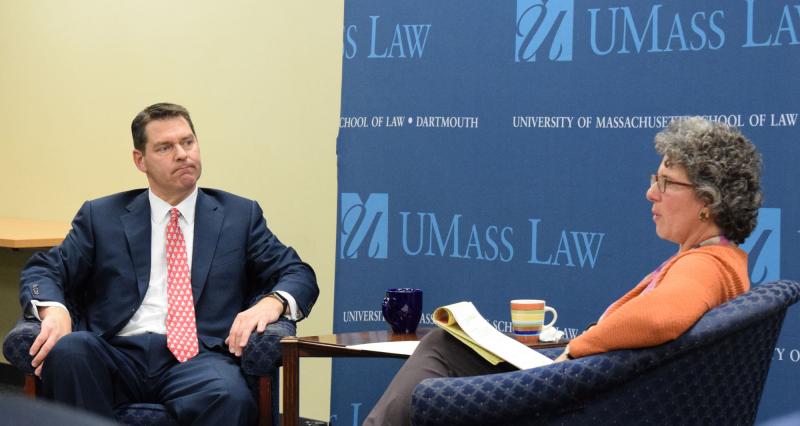Lawyer at center of Michelle Carter trial recounts case with law students
Attorney Joseph Cataldo was at the center of one of the country’s most talked-about trials last summer. Now, he’s sharing the experience of defending Michelle Carter, and the broad impact he said the case could have for years to come in legal precedent.
The case drew attention internationally, and in law classrooms at the University of Massachusetts Dartmouth School of Law. Professor Hillary Farber arranged the visit after her classes spent a semester studying the case in detail, and even drafted possible defenses in the case, which arose after the suicide of 18-year-old Fairhaven resident Conrad Roy III in 2014.
In 2017, Roy’s girlfriend Michelle Carter was convicted by a judge in Bristol County Juvenile Court of involuntary manslaughter on the grounds of text messages and phone calls encouraging Roy to commit suicide.
It’s that decision, and decisions made earlier in the case, that Cataldo told the crowd of students and professors could have far-reaching effects on free speech and culpability for years to come.
Cataldo knew the moment the charges came in the case would be controversial. With no law on the books in Massachusetts requiring people to intervene in suicide attempts, or laws criminalizing the encouragement of suicide, prosecutors opted to charge Carter with involuntary manslaughter.
Even before the trial began, Cataldo explained it raised serious questions of just how far words alone can go. It was brought to the state Supreme Judicial Court to rule if the text messages and communications fell under strict scrutiny of the First Amendment, and if her words and texts alone met the manslaughter statute. Ultimately, the court sided with prosecutors on both questions.
“I have always advocated, and will still continue to do, that this was a new rule; that the court is overstepping its bounds by coming up with a new law and applying it retroactively," Cataldo said, adding it is a task for the legislature, not the courts, to do.
Throughout the process, Cataldo hit hard on the idea of causation, arguing that even if Carter was reckless in her conduct, it was ultimately Roy who caused his own death.
“Here, that was the big issue,” Cataldo said. “The government had to prove reckless conduct on her part, but then they also had to prove that that reckless conduct actually caused Conrad Roy’s death.”
The Supreme Judicial Court also established that through the text messages, Carter established her “virtual presence” at the scene, which Cataldo said could also have far-reaching consequences as a precedent.
Central to Carter’s conviction was a legal principle called a “self-created duty” to act, which Judge Lawrence Moniz relied on in his decision. Through text messages sent from Carter to a friend after Roy’s death, prosecutors alleged that at one point during Roy’s suicide he exited the car and called Carter, but Carter told him to get back in the car.
Moniz ruled that placed the “self-created duty” on Carter, and her failure to seek help and her encouragement for him to get back in the car rose to the level of criminal conduct.
”The are certain duties the law recognizes, but this is a new one,” Cataldo said.
The trial was heard by a judge instead of a jury. Cataldo shared with students the reason for that decision. It was made because of the difficulty he knew jurors would face in taking in the tens of thousands of pages of text messages, psychiatric records, testimony, and the legal issues surrounding the case. The emotionally-charged nature of the case also worried Cataldo.
“There was a lot of complex legal issues combined with an extraordinary amount of reading,” he said. “We thought it was better for the a judge to go through the volume of issues.”
Carter faces 15 months in Bristol County House of Correction, five years probation, mental health treatment, and avoiding contact with Roy’s family except for legal matters. It is stayed pending her appeal, which is still in progress.













